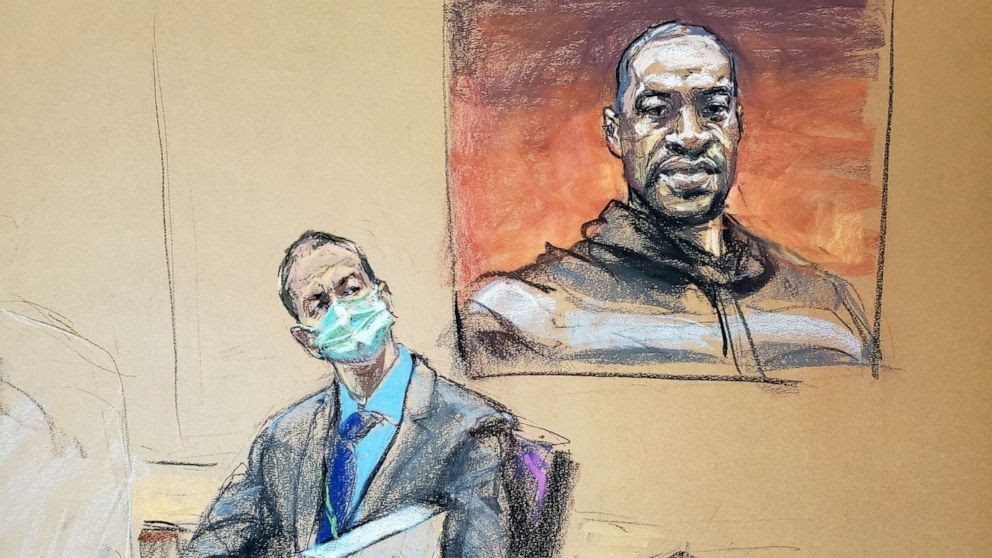Derek Chauvin Found Guilty For the Murder of George Floyd

Image Courtesy of REUTERS/Jane Rosenberg
By Margaret Adams
In one of the most historic trials of the past year, former Minneapolis police officer, Derek Chauvin, has been charged on all counts for the death of George Floyd, whose death sparked a monumental discussion about police reform throughout the US. On April 29, 2021, Chauvin, who was arrested on May 29, 2020, was pronounced guilty of second-degree unintentional murder, third-degree murder, and second-degree manslaughter charges for the death of Floyd.
The trial took place over the past three weeks in Hennepin County and included testimony from 45 witnesses.
One of the issues that this trial presented was acquiring an unbiased jury – the video of Floyd’s death was watched over 1.4 billion times within the first 12 days. The jury was eventually selected with 12 jurors and three alternates, one of whom was sent home on the first day of the trial.
Throughout the trial, the prosecution, which included attorneys Steve Schleicher and Jerry Blackwell, argued that Floyd died due to police restraints used during his arrest, not his stress levels, drug use, or heart disease.
“But none of this caused George Floyd’s heart to fail. It did not,” Schleicher said. “His heart failed because the defendant’s use of force, the nine [minutes] and twenty-nine [seconds], that deprived Mr. Floyd of the oxygen that he needed, that humans need, to live.”
Thirty-eight witnesses testified for the prosecution; Steve Schleicher and Jerry Blackwell’s argument consisted of evidence to prove that Floyd died of asphyxia, caused by Chauvin. Manner of death became very prevalent when the autopsy report read that he died of “cardiopulmonary arrest, complicating law enforcement subdual, restraint, and neck compression,” not specifically mentioning asphyxia.
World-renowned pulmonologist, Dr. Martin Tobin, a Chicago doctor and breathing expert, testified that Floyd was in fact killed by force used by Chauvin, not his other health issues or drug use: “A healthy person subjected to what Mr. Floyd was subjected to would have died.”
“In this case, the autopsy itself didn’t tell me the cause and manner of death,” said Dr. Lindsey Thomas, a forensic pathologist in Minneapolis, the following day. “In this case, it was primarily the evidence from the terminal events, the video evidence, that show Mr. Floyd in a position where he was unable to adequately breathe.”
Lt. Richard Zimmerman, 36-year veteran of the department and head of the homicide unit, also testified for the prosecution and explained that Chauvin’s force was unnecessary.
“First of all pulling him down to the ground face down and putting your knee on a neck for that amount of time is just uncalled for,” Zimmerman said. “I saw no reason why the officers felt they were in danger.”
Floyd’s younger brother, Philonise Floyd, also took the stand and testified as a “spark of life” witness and remembered his brother as a “leader in the household.”
“He just was like a person everybody loved around the community. He just knew how to make people feel better,” he said.
“Was George Floyd resisting when he was trying to breathe? No,” said Schleicher in his closing argument, adding that Chauvin chose to mock Floyd by saying, “It takes a lot of oxygen to complain.”
“This case is exactly what you thought when you saw it first, when you saw that video. It is exactly that. You can believe your eyes,” said Schleicher. “This wasn’t policing. This was murder.”
Defense attorney Eric Nelson called seven witnesses in order to argue that Chauvin’s force was “unattractive but appropriate,” that a crowd forming around Chauvin affected his judgement and actions, and that Floyd was not killed by Chauvin’s direct actions. Nelson argued that Floyd’s heart disease and drug use played a role in his death, as fentanyl and methamphetamine were found in his system during an autopsy.
“Take the time and make an honest assessment of the facts of this case,” he said in his closing statement. “We have to be intellectually honest about the evidence; we have to present it in an intellectually cohesive manner. … I submit to you the state has failed to meet its burden of proof beyond a reasonable doubt.”
One of the defense’s expert witnesses in training police officers, Barry Brodd, contradicted the prosecution’s claim by being the only witness to call Chauvin use of force appropriate.
“I felt that Officer Chauvin’s interactions with Mr. Floyd were following his training, following current practices in policing, and objectively reasonable,” Brodd said.
Through cross examination, Brodd also acknowledged that police in the Minneapolis Police Department are trained to “move suspects from the prone position to a side recovery position as soon as possible to avoid potential breathing difficulties,” according to USA Today.
A medical expert presented by the defense, Dr. David Fowler, said Floyd’s heart condition, drug use and a potential stomach tumor played a “significant” role in his death, calling his cause of death “undetermined.”
Chauvin pleaded the fifth amendment and did not testify during the trial, along with another witness who was present during the murder.
The jury of 12 deliberated for about 10 hours over the course of two days. Chauvin was found guilty on all three counts on Tuesday; Judge Cahill revoked his bail and announced that sentencing will begin in eight weeks. Cahill himself will decide on Chauvin’s sentence as Chauvin waived his right to a jury during sentencing.
Despite the guilty verdict, Judge Cahill commented that grounds for appeal may be present due to Rep. Maxine Waters’ comments:
“I’ll give you that Congresswoman Waters may have given you something on appeal that may result in this whole trial being overturned,” Judge Peter Cahill told defense attorney Eric Nelson on Monday.
According to the New York Times, Chauvin is currently being held in solitary confinement for “fear of his safety.”






